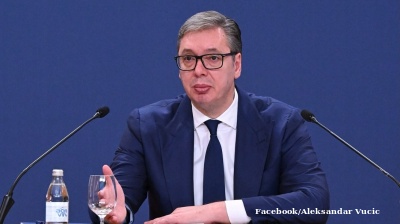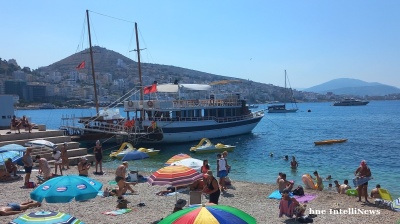The Western Balkans could play an increasingly important role in strengthening Europe’s security architecture, but countries in the region will need to modernise their militaries, attract investment and deepen integration with European Union defense initiatives, according to a new report from the Carnegie Europe think-tank.
In their paper “How the Western Balkans Can Contribute to European Defense,” authors Dimitar Bechev and Iliriana Gjoni argue that the region is shifting “from a consumer of outside support to a provider of stability”.
“Russia’s full-scale invasion of Ukraine in 2022 has made collective defence a priority for Europe,” the authors wrote. “More than three years into the war, it is all about how local stakeholders could chip in the collective effort to contain Russia on Nato and the EU’s eastern flank, strengthen resilience against hybrid threats, and shoulder responsibilities for peacekeeping closer to home.”
Albania, Montenegro and North Macedonia are already contributing to Nato operations, with Albania alone deploying some 500 military personnel in various Nato and EU missions, the report notes. Tirana is also investing in new logistics and training facilities to support allied operations and developing artificial intelligence technologies for defence purposes.
North Macedonia’s Krivolak training range, described by Carnegie as “one of the alliance’s top locations for exercises,” hosted a major drill this summer, underlining the region’s growing operational relevance.
Even Serbia — the region’s only nonaligned state and a traditional partner of Russia — is being drawn into Europe’s defence supply chain. The report cites claims by Russian intelligence that Belgrade indirectly supplied ammunition to Ukraine through intermediaries, a charge Serbia denies but which signals “an implicit shift in positioning,” according to the authors.
The Western Balkans are home to around 200 defence companies, mainly in Serbia and Bosnia & Herzegovina, that can manufacture both Nato-standard and former Warsaw Pact ammunition. Carnegie notes that Bosnia’s defence industry could potentially outproduce major EU-based ventures, with its annual output capacity “five times higher than the €1bn joint venture between Bulgaria’s VMZ and Germany’s Rheinmetall.”
Opportunities in EU defence integration
Bechev and Gjoni argue that the Western Balkans could access “common European mechanisms, programs, and financial instruments” such as the European Defence Fund and the forthcoming European Defence Industry Programme (EDIP), which is expected to offer €1.5bn in grants between 2025 and 2027.
Ties with the European Defence Agency (EDA) could also deepen. Serbia established formal working relations with the EDA in 2014, while Albania and North Macedonia have signed partnerships with the EU that include defence cooperation. Ideally, the report says, all six Western Balkan countries should become EDA members “possibly without voting rights until they join the EU.”
According to Carnegie, there is “growing appetite among EU member states—including France and Italy—for deepening security cooperation with Western Balkan countries,” particularly in dual-use infrastructure and defence industry development.
Persistent obstacles
However, significant challenges remain. Political divisions, weak governance and competing foreign policy orientations could hinder progress. “So long as Serbia pursues a multivector foreign and security policy and imports military equipment from Russia and China, cooperation will face obstacles,” the report cautions.
Carnegie also highlights entrenched problems in the region’s security sectors, where “the primary role of the military, intelligence, police, and law enforcement sectors is to sustain the power of incumbents and protect clientelist networks, rather than serve the public interest.”
Transnational organised crime continues to have “symbiotic relationships with the guardians of the state” in parts of the region, including Albania, Montenegro and Serbia, the report adds, warning that this “stymies effective integration into EU and Nato mechanisms.”
The region’s small economies and limited defence budgets further constrain development. “It is difficult to attract strategic international investment into small-size economies, unless they pull together,” Bechev and Gjoni write. Most Western Balkan states still spend less than 2% of GDP on defence, well below Nato’s 3.5% target agreed at the Hague summit earlier this year.
Because of their geographical distance from Russia and “the lack of memory of control by Moscow,” defence planning and threat perception in the Balkans remain muted compared to Eastern Europe, the authors observe.
The report concludes that while the Western Balkans have the potential to become “net contributors to European security,” achieving that goal will require deeper regional cooperation, stronger governance, and more ambitious modernisation plans.
Opinion

COMMENT: Sanctions on Rosneft and Lukoil are symbolic and won’t stop its oil exports
The Trump administration’s sanctions on Russian oil giants Rosneft and Lukoil, announced on October 22, may appear decisive at first glance, but they are not going to make a material difference to Russia’s export of oil, says Sergey Vakulenko.

Armenia’s painful reorientation toward the West
Yerevan’s drive to break free from its dependency on Moscow is generating profound internal political turbulence and exposing it to new external risks, says a report by the Central Asia‑Caucasus Institute & Silk Road Studies Program.

COMMENT: Europe’s “fake it till you make it” war approach cannot hold off Russia’s trillion dollar war machine
In their speeches on the war in Ukraine, European leaders appear like a video clip looped on repeat. Standing before the cameras they declare new packages of support for Kyiv and threaten new measures to pressure Russia as if it was still 2022.

A year after the Novi Sad disaster, Belgrade faces one crisis after another
Serbia’s government is grappling with a convergence of crises which threaten to erode President Aleksandar Vucic’s once-dominant position.




